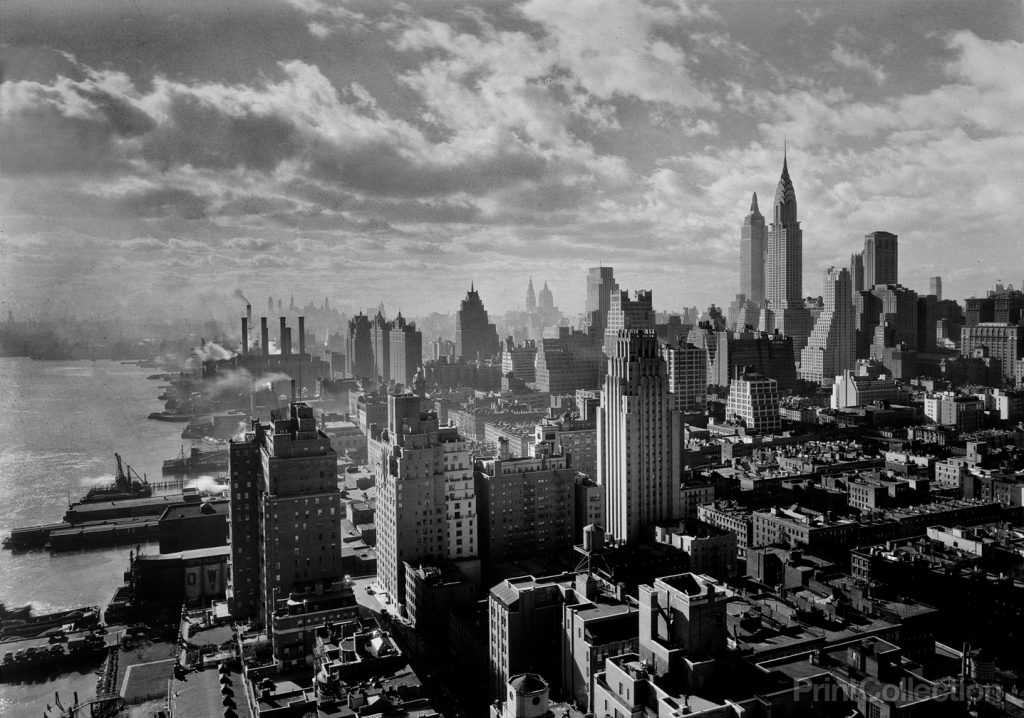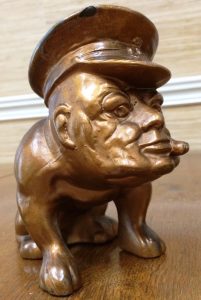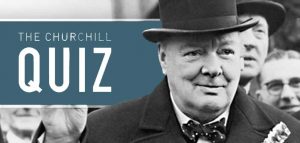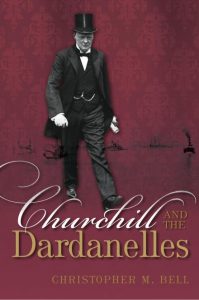Bulletin #111 - Sep 2017
My New York Misadventure

Manhattan, 1931
September 12, 2017
On the night of 13 December 1931, history nearly took a turn for the worst when Winston Churchill left the Waldorf Astoria Hotel in New York City to visit a friend up town. A few weeks later, he recalled what happened next in an article for The Daily Mail.
I had finished dinner and was inclined to go to bed; but an old friend of mine rang up and suggested that I should go round to his house. He was Mr. Bernard Baruch, who was the head of the War Industries Board during the two years I was Minister of Munitions. He said he had one or two mutual friends whom I was most anxious to meet, and as the hour was a little after half past nine, I was readily enlisted in the project.
I descended by lift the thirty-nine storeys which separated my room from the street level. When I arrived at the bottom it occurred to me that I did not know the exact number in Fifth Avenue of my friend’s house. I knew it was somewhere near 1100. I knew the aspect of the house; I had been there by daylight on several occasions. It was a long house of only five or six storeys standing with one or two others of similar construction amid large apartment buildings of more than double the height. I thought it probable I would pick it out from the windows of my waiting taxicab, so after a vain search in the telephone book—only Mr. Baruch’s business address was there—I started.
[Arriving at what appeared the location] I told the cabman to stop where he was on the Central Park side of the avenue; I would walk across the road myself and inquire in the most likely house. But at this moment habit played me a deadly trick. I no sooner got out of the cab somewhere about the middle of the road and told the driver to wait than I instinctively turned my eyes to the left. About 200 yards away were the yellow headlights of an approaching car. I thought I had just time to cross the road before it arrived; and I started to do so in the prepossession—wholly unwarranted—that my only dangers were from the left.
Suddenly upon my right I was aware of something utterly unexpected and boding mortal peril. I turned my head sharply. Right upon me, scarcely its own length away, was what seemed a long dark car rushing forward at full speed. Then came the blow. I felt it on my forehead and across the thighs. But besides the blow there was an impact, a shock, a concussion indescribably violent.
Mario Constasino, owner of a medium-sized automobile, was running between 30 and 35 miles an hour on roads which were wet and greasy. He was on his proper side of the road and perfectly entitled to make the best speed he could, when suddenly a dark figure appeared immediately in front of him. He applied all his brakes, and at the same moment, before they could act, he struck a heavy blow. The car shuddered, and, after skidding somewhat under the brakes, came to rest in probably a few lengths. Three or four feet from the right-hand wheel lay a black, shapeless mass.
Mario had driven for eight or nine years and had never had an accident. He seems to have been overpoweringly agitated and distressed. He heard a loud cry, “A man has been killed!” The traffic banked up on either side. People came running from all directions. Constables appeared. One group clustered around Mario, another around the prostrate figure.
Meanwhile, I had not lost consciousness for an instant. I have an impression of traffic arrested and of dramatically gathered crowds. Then more definite impressions. A constable is bending over me. He has a book, quite a big book, in his hand.
“What is your name?”
“Winston Churchill.”
“What is your age?”
“Fifty-seven,” I replied.
The constable proceeded to demand particulars of the accident. To save trouble, I said:
“I am entirely to blame; it is all my own fault.”
Later it seemed that another constable came up with the question, “Do you make any charge against any person?” To which I replied, “I exonerate everyone.”
At this the interrogation ceased abruptly, and Mario in the background (though I did not know this until afterwards) was released from captivity.
During all this time I was in what I suppose would be called great pain. Gradually I began to be more aware of all that was going on around me. It appears that an ambulance was passing, and the crowd stopped it and demanded that it should take me to the nearest hospital. The ambulance, which had a serious case on board, refused. Thereupon a taximan exclaimed in a voice which I could perfectly well hear, “Take him in my cab. There’s the Lennox-hill Hospital on 76th Street.”
By the time we pulled up at the hospital I had the assurance that, although I might have an arm or leg or two broken and was certainly bruised and shaken, the whole main structure of the body was sound. Blood continued to flow freely from my forehead and my nose; but I did not worry about that at all, because in my sanctum we had decided: “There can be no brain injury, as we have never lost consciousness even for a second.”
At last we arrive at the hospital. A wheeled chair is brought. I am carried into it. I am wheeled up steps into a hall and a lift. By now I feel battered but perfectly confident. They said afterwards I was confused; but I did not feel so.
“Are you prepared to pay for a private room and doctor?” asked a clerk.
“Yes, bring all the best you have. Take me to a private room. Where is your telephone? Give me the Waldorf Astoria. I will tell my wife myself that whatever has happened I am going to get well.”
But after an interval they said, “She is already on the way here.”
Soon I am on a bed. Presently come keen, comprehending eyes and deft, firm fingers.
“We shall have to dress that scalp at once. It is cut to the bone.”
“Will it hurt?”
“Yes.”
“I do not wish to be hurt anymore. Give me some chloroform or something.”
“The anesthetist is already on the way.”
More lifting and wheeling. The operating room. White glaring lights. The mask of a nitrous-oxide inhaler.
Without a perceptible interval consciousness returns. Reassuring words are spoken. I see a beloved face. My wife is smiling. In the background there rises the grave, venerable countenance of Mr. Bernard Baruch. So I ask:
“Tell me, Baruch, when all is said and done, what is the number of your house?”
“1055.”
“How near was I to it when I was smashed up?”
“Not within ten blocks.”
Such in short were my experiences on the night of 13 December; and the message I bring back from these dark places is one of encouragement.
I certainly suffered every pang, mental and physical, that a street accident or, I suppose, a shell wound can produce. None is unendurable. There is neither the time nor the strength for self-pity. There is no room for remorse or fears.
I ought not forget to add that I have since looked into my despatch box and I have found that my far-seeing private secretary in England, Mrs. Pearman, had furnished me with a traveling address book of people I might want to communicate with in the United States, and in this I read: “Baruch, 1055 Fifth Avenue,” with the private telephone number duly set out.
Join the International Churchill Society in New York City next month for the thirty-fourth International Churchill Conference. You can read Churchill’s full account in Finest Hour 136.
Subscribe
WANT MORE?
Get the Churchill Bulletin delivered to your inbox once a month.






